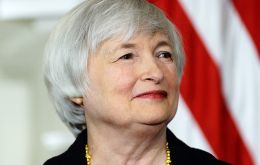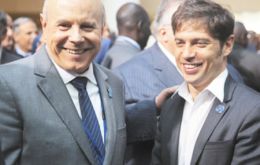MercoPress. South Atlantic News Agency
Economy
-
Friday, May 2nd 2014 - 09:27 UTC
Uruguay's budget fiscal deficit climbs in March to its highest since October 2003

Uruguay's fiscal deficit climbed to 3.2% of GDP during March, the highest since October 2003, --equivalent to 1.69 billion dollars--, but Economy minister Mario Bergara said that there is no risk for “the sustainability of public accounts or sustainability of current macroeconomic policies”.
-
Friday, May 2nd 2014 - 09:03 UTC
Brazil confirms Mercosur/EU are ready to exchange proposals in a month's time

Brazil confirmed this week that for the end of May or early June, Mercosur will be presenting its joint tariff-reduction proposal to the European Union for the conclusion of an ambitious, but long delayed, cooperation and trade agreement.
-
Friday, May 2nd 2014 - 08:42 UTC
If EU dumps independent Scotland, 12 countries would be barred from its fishing waters

Scottish First Minister warned that 12 countries could be barred from his country’s waters and would not even be allowed to pass through to reach Norwegian waters if an independent Scotland was refused European Union (EU) membership.
-
Friday, May 2nd 2014 - 08:37 UTC
Labor Day with raft of increases in Argentina: train fares, gasoline, cigarettes and air tickets

Despite Labor Day to honor workers, May begins with bad news for Argentine consumers: fare increases for trains and domestic flights tickets and rises on cigarettes and gasoline prices ranging from 4% to 100% in the case of train tariffs.
-
Thursday, May 1st 2014 - 07:33 UTC
Brazil raises taxes on beer and sodas; primary surplus slightly down in March

The Brazilian government will raise taxes on beers, sodas and other beverages in a move that will raise an extra 1.5 billion Reais (674 million dollars) in revenue to help meet the fiscal savings goal. Earlier this month, the government had already announced a tax hike on beer to bolster fiscal accounts that have been hit hard over the last three years by rising subsidies, higher spending and an economic slowdown.
-
Thursday, May 1st 2014 - 06:58 UTC
Fed optimistic about US economy; pares securities purchases by another 10bn dollars

The Federal Reserve looked past a dismal reading on first quarter US growth and gave a mostly upbeat assessment of the economy's prospects as it announced another cut in its massive bond-buying stimulus. Latest information indicates that economic activity has picked up after having slowed sharply during the winter in part because of adverse weather conditions, the central bank said on Wednesday.
-
Wednesday, April 30th 2014 - 09:22 UTC
Argentina and Brazil agree to further integrate and prop their auto industries

Argentina and Brazilian officials agreed to continue meeting regularly to solve as soon as possible bilateral trade problems mainly those referred to the auto industry. On Tuesday Argentine Finance minister Axel Kicillof and Industry minister Deborah Giorgi met their Brazilian counterparts, Guido Mantega and Mauro Borges in Brasilia.
-
Wednesday, April 30th 2014 - 09:18 UTC
Argentina's top auto industry leader calls for new markets and lower costs

One of Argentina's main industry leaders Fiat Argentina CEO Cristiano Rattazi denied the existence of a “serious situation” in the automobile industry, “so far” and pointed out the need to “seek new markets” to reverse current downward trends in car manufacturing.
-
Wednesday, April 30th 2014 - 09:14 UTC
Latam and Caribbean forecasted to expand 2.7% on average this year

Latin American and Caribbean countries are estimated to grow an average 2.7% in 2014 as the region's main economies have limited dynamism according to ECLAC's Updated Economic Review of Latam and the Caribbean 2013, released on Tuesday.
-
Wednesday, April 30th 2014 - 08:57 UTC
Poverty in Argentina stands at 27.5% of population, says Catholic University

Poverty and indigence in Argentina in the last quarter of 2013 again increased and reached 27,5% of the population and 17.8% of households, according to the latest report from the Catholic University Social Debt Observatory, UCA.
